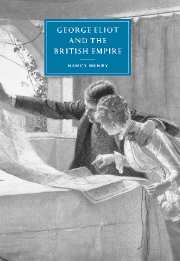Book contents
- Frontmatter
- Contents
- List of illustrations
- Acknowledgments
- List of abbreviations and note on the texts
- Introduction
- 1 Imperial knowledge: George Eliot, G. H. Lewes, and the literature of empire
- 2 “Colleagues in failure”: emigration and the Lewes boys
- 3 Investing in empire
- 4 Daniel Deronda, Impressions of Theophrastus Such, and the emergence of imperialism
- Conclusion
- Notes
- Bibliography
- Index
- CAMBRIDGE STUDIES IN NINETEENTH-CENTURY LITERATURE AND CULTURE
2 - “Colleagues in failure”: emigration and the Lewes boys
Published online by Cambridge University Press: 22 September 2009
- Frontmatter
- Contents
- List of illustrations
- Acknowledgments
- List of abbreviations and note on the texts
- Introduction
- 1 Imperial knowledge: George Eliot, G. H. Lewes, and the literature of empire
- 2 “Colleagues in failure”: emigration and the Lewes boys
- 3 Investing in empire
- 4 Daniel Deronda, Impressions of Theophrastus Such, and the emergence of imperialism
- Conclusion
- Notes
- Bibliography
- Index
- CAMBRIDGE STUDIES IN NINETEENTH-CENTURY LITERATURE AND CULTURE
Summary
If we have young friends whom we wish to send forth into the world, we search the maps with them at our elbows.
Anthony TrollopeBy the 1860s, the colonies had become a repository not only for criminals, fallen women, and the poor, but also for the sons of wealthy middle-class parents such as Eliot, Dickens, and Trollope. India remained the imperial outpost of choice, but Australia, Canada, and South Africa offered alternatives for young men who, despite educational and financial advantages, were able to succeed neither at home nor in India. Lewes and Eliot faced their own version of a larger social problem, what in the 1880s came to be called the “younger son question.” According to Patrick A. Dunae, a growing number of middle-class sons and of public schools to educate them meant that “the professions which were regarded as being most suitable for gentlemen could not accommodate this greatly enlarged pool of gentlemanly aspirants.” Many of these “supernumerary gentlemen” turned to the colonies. For Lewes and Eliot, who sought positions for Lewes's younger sons that were consistent with their middle-class life yet geographically far from it, the empire offered a particularly attractive solution.
The story of the Lewes boys' colonial careers is an early instance of the “younger son question,” remarkable but typical in its lack of structure and imperialist motive.
- Type
- Chapter
- Information
- George Eliot and the British Empire , pp. 42 - 76Publisher: Cambridge University PressPrint publication year: 2002



